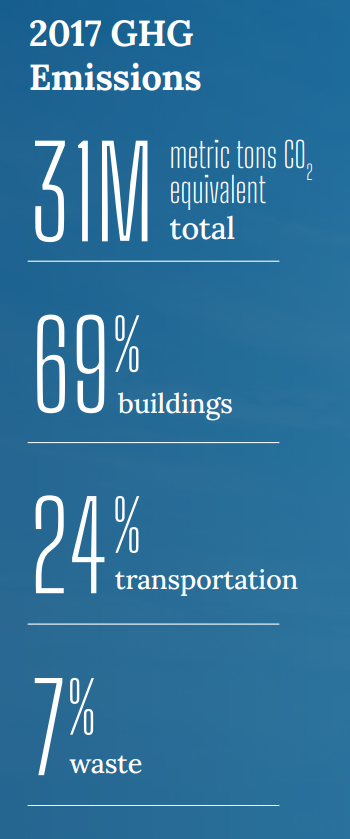Electrify Chicago
An independent tool for viewing City of Chicago building data
According to the
2022 Chicago Climate Action Plan,
69% of Chicago's emissions come from buildings, making
building emissions our biggest challenge and our biggest opportunity as a city
to tackle climate change. At Electrify Chicago, we showcase building performance using
publicly available data supplemented by community-submitted photographs and building
owners.
Start by looking at Chicago's buildings with the highest greenhouse gas intensity i.e. emissions per square foot. Large, efficient, buildings can perform much better than very inefficient small buildings on this metric.
New Article
📰 $30 Million In Missed Fines
The City Of Chicago failed to collect $30 million in potential fines from the building benchmarking ordinance, reducing transparency and accountability.
Legislative update! 🎉
As of late January 2024, legislation is being introduced to require new use more efficient forms of water and space heating, via the Clean And Affordable Buildings Ordinance (CABO), which will reduce the number of highly polluting and inefficient buildings that end up on this site.
If you're in Chicago,
write to your alderman to support the CABO!
Chicago Buildings by Greenhouse Gas Intensity
Note: Data includes large Chicago buildings with data from 2022, unless explicitly stated otherwise.
Note: This data only includes buildings whose emissions are reported
under the
Chicago Energy Benchmarking Ordinance. According to the City “As of 2016,
this list includes all commercial, institutional, and residential buildings larger than
50,000 square feet.” This dataset is also then filtered to only buildings with
reported emissions > 1,000 metric tons CO2 equivalent.
The latest year of data is from 2022, but we update the site regularly when new data is available, and some buildings may have failed to report that year, and only have older data available.
| Property Name / address | Primary Property Type |
Greenhouse Gas Intensity (kg CO2 eq./sqft) |
Total Greenhouse Emissions (metric tons CO2 eq.) |
|---|---|---|---|
|
21 E CHESTNUT ST
21 E CHESTNUT ST
| Multifamily Housing | 9.1 kg/sqft
Highest 18%
| 1,118 tons
Highest 41%
|
|
Saint Vincent Center
721 N Lasalle St
| Office | 9.1 kg/sqft
Highest 18%
| 858 tons
Lowest 49%
|
|
700 N Michigan Ave LLC
700 N Michigan Ave
| Retail Store | 9.1 kg/sqft
Highest 18%
| 1,608 tons
Highest 29%
|
|
The Boyce Building
500 - 510 N Dearborn St
| Office | 9.1 kg/sqft
Highest 18%
| 1,352 tons
Highest 35%
|
|
Haugan Middle (Aspira Charter)
🕰️
3729 W Leland Ave
| K-12 School | 9.1 kg/sqft | 996 tons |
|
Disney Magnet -CPS
(CPS)
4140 N Marine Dr
| K-12 School | 9.1 kg/sqft
Highest 18%
| 2,373 tons
Highest 19%
|
|
Burnham Center
🕰️
111 W Washington
| Office | 9.1 kg/sqft | 5,417 tons |
|
111 N Canal
111 N Canal St
| Office | 9.1 kg/sqft
Highest 18%
| 8,908 tons
Highest 3%
|
|
Harris Bank Building
🕰️
115 S LaSalle St
| Office | 9.1 kg/sqft | 13,824 tons |
|
Alta Grand Central
221 W Harrison St
| Multifamily Housing | 9.0 kg/sqft
Highest 19%
| 2,131 tons
Highest 21%
|
|
504 N. Green St.
🕰️
504 N GREEN ST
| Multifamily Housing | 9.0 kg/sqft | 1,129 tons |
|
Fox Ford Lincoln Chicago
2501 N ELSTON AVE
| Vehicle Dealership | 9.0 kg/sqft
Highest 19%
| 1,315 tons
Highest 36%
|
|
Peter V. Byrne Hall
(DePaul)
2219 N Kenmore Ave
| College/University | 9.0 kg/sqft
Highest 19%
| 699 tons
Lowest 40%
|
|
Target, Chicago Mid North (1437)
2939 W Addison St
| Retail Store | 9.0 kg/sqft
Highest 19%
| 1,725 tons
Highest 27%
|
|
Providence Englewood Bunche Elementary Charter
6515 S Ashland Ave
| K-12 School | 9.0 kg/sqft
Highest 19%
| 485 tons
Lowest 25%
|
Data Source:
Chicago Energy Benchmarking Data
